Related Research Articles
Emo is a music genre characterized by emotional, often confessional lyrics. It emerged as a style of hardcore punk and post-hardcore from the mid-1980s Washington, D.C. hardcore scene, where it was known as emotional hardcore or emocore. The bands Rites of Spring and Embrace, among others, pioneered the genre. In the early-to-mid 1990s, emo was adopted and reinvented by alternative rock, indie rock, punk rock, and pop-punk bands, including Sunny Day Real Estate, Jawbreaker, Cap'n Jazz, and Jimmy Eat World. By the mid-1990s, Braid, the Promise Ring, and the Get Up Kids emerged from Midwest emo, and several independent record labels began to specialize in the genre. Meanwhile, screamo, a more aggressive style of emo using screamed vocals, also emerged, pioneered by the San Diego bands Heroin and Antioch Arrow. Screamo achieved mainstream success in the 2000s with bands like Hawthorne Heights, Silverstein, Story of the Year, Thursday, the Used, and Underoath.

Rites of Spring was an American punk rock band from Washington, D.C., formed in late 1983. Along with Embrace, and Beefeater, they were one of the mainstay acts of the 1985 Revolution Summer movement which took place within the Washington, D.C. hardcore punk scene.
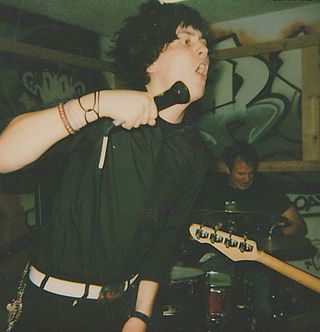
Screamo is a subgenre of emo that emerged in the early 1990s and emphasizes "willfully experimental dissonance and dynamics". San Diego–based bands Heroin and Antioch Arrow pioneered the genre in the early 1990s, and it was developed in the late 1990s mainly by bands from the East Coast of the United States such as Pg. 99, Orchid, Saetia, and I Hate Myself. Screamo is strongly influenced by hardcore punk and characterized by the use of screamed vocals. Lyrical themes usually include emotional pain, death, romance, and human rights. The term "screamo" has frequently been mistaken as referring to any music with screaming.

Samiam is an American punk rock band from Berkeley, California, active since 1988.

Jawbreaker is an American punk rock band that was active from 1986 to 1996, and again since 2017. The band is considered to be extremely influential to the 1990s emo and punk genre with their "poetic take on hardcore." Their influence on the punk scene has led some critics to label Jawbreaker as the best punk rock band of the 1990s.

The Appleseed Cast is an American rock band from Lawrence, Kansas. The band was founded in the early days of emo by singer-guitarist Christopher Crisci and drummer Louie Ruiz. The Appleseed Cast has steadily evolved over the release of eight full-length albums with Crisci serving as the main songwriter. The band has a frequently rotating lineup, with Crisci being the only consistent member since their conception. Currently the band's lineup includes Christopher Crisci, Ben Kimball, Nick Fredrickson and Sean Bergman.
Deep Elm Records is an independent record label releasing albums by bands such as Lights & Motion, The Appleseed Cast, Brandtson, The White Octave, and Planes Mistaken for Stars. It also released the compilation series The Emo Diaries.
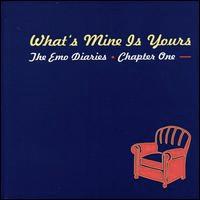
What's Mine Is Yours is the first installment in The Emo Diaries series of compilation albums, released September 16, 1997 by Deep Elm Records. The series title was originally going to be The Indie Rock Diaries, but this was ruled out when Jimmy Eat World and Samiam, who were both signed to major record labels, were selected for the album. The Emo Diaries was chosen because The Emotional Diaries was too long to fit on the album cover. As with future installments, the label had an open submissions policy for bands to submit material for the compilation; as a result, the music does not all fit within the emo style. As with the rest of the series, What's Mine Is Yours features mostly unsigned bands contributing songs that were previously unreleased.
Emo pop is a fusion genre combining emo with pop-punk, pop music, or both. Emo pop features a musical style with more concise composition and hook-filled choruses. Emo pop has its origins in the 1990s with bands like Jimmy Eat World, the Get Up Kids, Weezer and the Promise Ring. The genre entered the mainstream in the early 2000s with Jimmy Eat World's breakthrough album Bleed American, which included its song "The Middle". Other emo pop bands that achieved mainstream success throughout the decade included Fall Out Boy, the All-American Rejects, My Chemical Romance, Panic! at the Disco and Paramore. The popularity of emo pop declined in the 2010s, with some prominent artists in the genre either disbanding or abandoning the emo pop style.

A Million Miles Away is the second installment in The Emo Diaries series of compilation albums, released April 14, 1998, by Deep Elm Records. As with all installments in the series, the label had an open submissions policy for bands to submit material for the compilation; as a result, the music does not all fit within the emo style. As with the rest of the series, A Million Miles Away features mostly unsigned bands contributing songs that were previously unreleased.
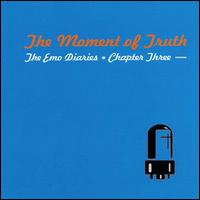
The Moment of Truth is the third installment in The Emo Diaries series of compilation albums, released February 23, 1999 by Deep Elm Records. As with all installments in the series, the label had an open submissions policy for bands to submit material for the compilation; as a result, the music does not all fit within the emo style. As with the rest of the series, The Moment of Truth features mostly unsigned bands contributing songs that were previously unreleased.
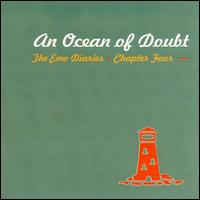
An Ocean of Doubt is the fourth installment in The Emo Diaries series of compilation albums, released September 28, 1999, by Deep Elm Records. As with all installments in the series, the label had an open submissions policy for bands to submit material for the compilation; as a result, the music does not all fit within the emo style. As with the rest of the series, An Ocean of Doubt features mostly unsigned bands contributing songs that were previously unreleased. Notably, it features the first song released by Further Seems Forever.

I Guess This Is Goodbye is the fifth installment in The Emo Diaries series of compilation albums, released October 24, 2000 by Deep Elm Records. As with all installments in the series, the label had an open submissions policy for bands to submit material for the compilation; as a result, the music does not all fit within the emo style. As with the rest of the series, I Guess This Is Goodbye features mostly unsigned bands contributing songs that were previously unreleased.

The Silence in My Heart is the sixth installment in The Emo Diaries series of compilation albums, released July 24, 2001, by Deep Elm Records. As with all installments in the series, the label had an open submissions policy for bands to submit material for the compilation; as a result, the music does not all fit within the emo style. As with the rest of the series, The Silence in My Heart features mostly unsigned bands contributing songs that were previously unreleased.

Me Against the World is the seventh installment in The Emo Diaries series of compilation albums, released March 5, 2002 by Deep Elm Records. As with all installments in the series, the label had an open submissions policy for bands to submit material for the compilation; as a result, the music does not all fit within the emo style. As with the rest of the series, Me Against the World features mostly unsigned bands contributing songs that were previously unreleased.

My Very Last Breath is the eighth installment in The Emo Diaries series of compilation albums, released July 23, 2002 by Deep Elm Records. As with all installments in the series, the label had an open submissions policy for bands to submit material for the compilation; as a result, the music does not all fit within the emo style. As with the rest of the series, My Very Last Breath features mostly unsigned bands contributing songs that were previously unreleased.

Sad Songs Remind Me is the ninth installment in The Emo Diaries series of compilation albums, released June 24, 2003 by Deep Elm Records. As with all installments in the series, the label had an open submissions policy for bands to submit material for the compilation; as a result, the music does not all fit within the emo style. As with the rest of the series, Sad Songs Remind Me features mostly unsigned bands contributing songs that were previously unreleased.
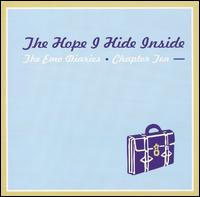
The Hope I Hide Inside is the tenth installment in The Emo Diaries series of compilation albums, released April 27, 2004 by Deep Elm Records. As with all installments in the series, the label had an open submissions policy for bands to submit material for the compilation; as a result, the music does not all fit within the emo style. As with the rest of the series, The Hope I Hide Inside features mostly unsigned bands contributing songs that were previously unreleased.
Midwest emo refers to the emo scene and/or subgenre that developed in the 1990s Midwestern United States. Employing unconventional vocal stylings, distinct guitar riffs and arpeggiated melodies, Midwest emo bands shifted away from the genre's hardcore punk roots and drew on indie rock and math rock approaches. According to the author and critic Andy Greenwald, "this was the period when emo earned many, if not all, of the stereotypes that have lasted to this day: boy-driven, glasses-wearing, overly sensitive, overly brainy, chiming-guitar-driven college music." Midwest emo is sometimes used interchangeably with second-wave emo. Although implied by the name, Midwest emo does not solely refer to bands and artists from the Midwestern United States, and the style is played by outfits across the United States and internationally.
References
- 1 2 3 4 Greenwald, Andy (2003). Nothing Feels Good: Punk Rock, Teenagers, and Emo . New York City: St. Martin's Griffin. p. 119. ISBN 0-312-30863-9.
- 1 2 Greenwald, pp. 118–119.
- 1 2 "The Emo Diaries". Deep Elm Records . Retrieved March 27, 2009.
- 1 2 3 "Taking Back What's Ours: The Emo Diaries, Chapter Eleven". Deep Elm Records . Retrieved April 8, 2009.
- ↑ Paul, Aubin (April 14, 2010). "Deep Elm looking for submissions for 'Emo Diaries 12'". Punknews.org. Retrieved April 14, 2010.
- ↑ "Emo Diaries No. 12 – I Love You But in the End I Will Destroy You". Deep Elm Records . Retrieved February 7, 2011.